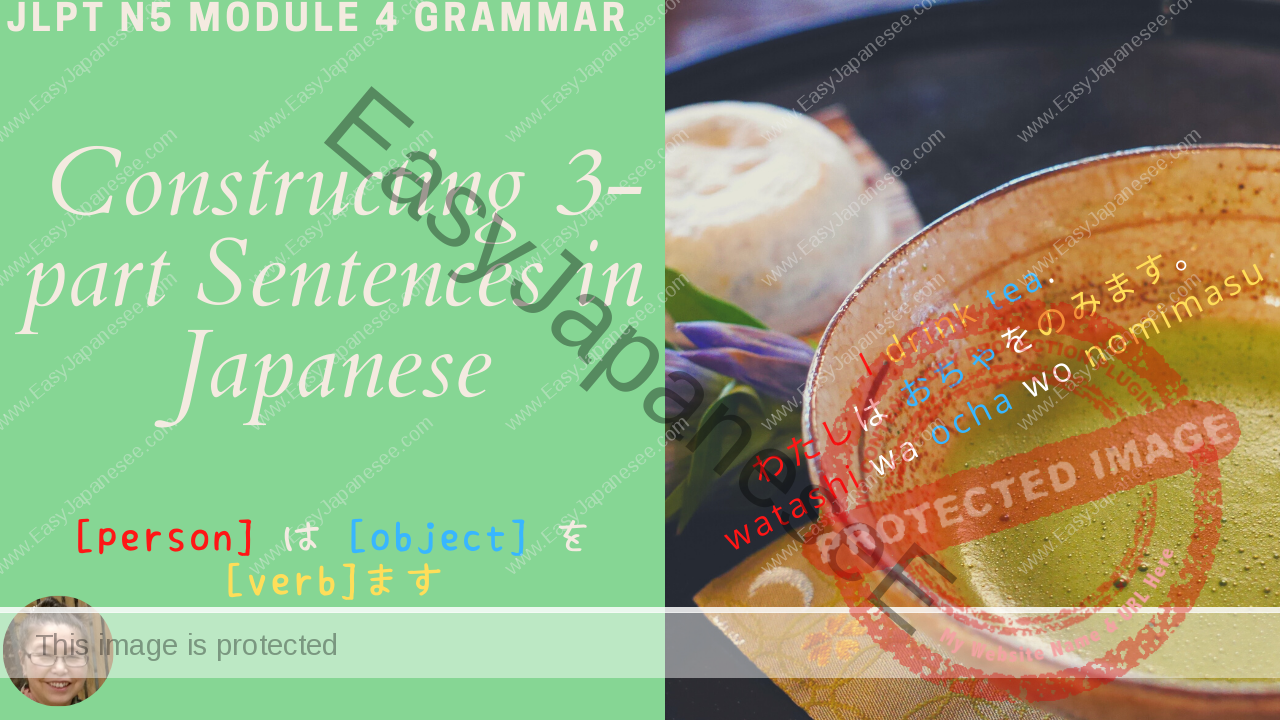Let’s learn basic verbs and start making simple sentences. Watch this video and the following verbs all can be used in the same way as shown in this video.
Verbs
| Hiragana | Roomaji | Group* | Meaning in English | Example | Translation |
|---|---|---|---|---|---|
| おしえます | oshiemasu | 1-dan | to teach, to tell, to inform | わたしは にほんごを おしえます。 | I teach Japanese. |
| おぼえます | oboemasu | 1-dan | to remember, to memorize | わたしは ひらがなを おぼえます。 | I memorize Hiragana. |
| かいます | kaimasu | 5-dan | to buy | わたしは じしょを かいます。 | I buy a dictionary. |
| かきます | kakimasu | 5-dan | to write, to draw | わたしは ひらがなを かきます。 | I write Hiragana. |
| ききます | kikimasu | 5-dan | to hear, to listen to, to ask | わたしは ラジオを ききます。 | I listen to a radio. |
| します | shimasu | irregular | to do, to play | わたしは そうじを します。 | I clean (= I do cleaning.) |
| しめます | shimemasu | 1-dan | to close, to shut | わたしは まどを しめます。 | I shut the window. |
| たべます | tabemasu | 1-dan | to eat | わたしは ごはんを たべます。 | I eat rice. |
| つかいます | tsukaimasu | 5-dan | to use | わたしは ペンを つかいます。 | I use a pen. |
| つくります | tsukurimasu | 5-dan | to make, to create | わたしは ケーキを つくります。 | I make a cake. |
| とります | torimasu | 5-dan | to take (an item or a photo) | わたしは しゃしんを とります。 | I take a photo. |
| ならいます | naraimasu | 5-dan | to learn, to have lessons of | わたしは にほんごを ならいます。 | I learn Japanese. |
| のみます | nomimasu | 5-dan | to drink | わたしは みずを のみます。 | I drink water. |
| はなします | hanashimasu | 5-dan | to speak | わたしは にほんごを はなします。 | I speak Japanese. |
| ひきます | hikimasu | 5-dan | to play (string instrument) | わたしは ピアノを ひきます。 | I play the piano. |
| ふきます | hukimasu | 5-dan | to blow (wind, etc) | わたしは フルートを ふきます。 | I play the flute. |
| みます | mimasu | 1-dan | to see, to watch | わたしは テレビを みます。 | I watch TV. |
| よみます | yomimasu | 5-dan | to read | わたしは ほんを よみます。 | I read a book. |
| わたします | watashimasu | 5-dan | to pass over, to hand over | わたしは てがみを わたします。 | I hand over a letter. |
Words that can be used as an Object
| Hiragana | Roomaji | English |
|---|---|---|
| あさごはん | asagohan | breakfast |
| え | e | picture, drawing, painting, sketch |
| えいが | eiga | movie, film |
| えいご | eigo | the English language |
| おさら | osara | plate, dish |
| おべんとう | obentou | packed meal |
| きって | kitte | stamp (e.g. postage) |
| きっぷ | kippu | ticket |
| くすり | kusuri | medicine |
| けっこん | kekkon | marriage |
| ごはん | gohan | rice (cooked), meal |
| さくぶん | sakubun | composition, writing |
| ざっし | zasshi | magazine |
| しゃしん | shashin | photograph |
| しんぶん | shinbun | newspaper (refers to the content of the newspaper, not the paper itself) |
| てがみ | tegami | letter |
| テレビ | terebi | television, TV |
| のみもの | nomimono | drink, beverage |
| はなし | hanashi | talk, story |
| ばんごはん | bangohan | dinner, evening meal |
| ひるごはん | hirugohan | lunch, midday meal |
| ほん | hon | book |
| ゆうはん | yuuhan | dinner |
| ラジオ | rajio | radio |
| レコード | reko-do | record, vinyl record |
Suggested Activities
Try to match up objects and verbs so that the pair will make sense.
Do the exercise 1 of Module 4 of the Moodle course.

